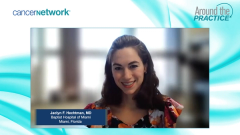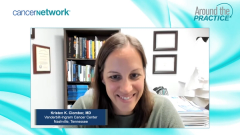
Metastatic CRC: Selecting the Appropriate HER2-Directed Therapy
Experts offer insights on the appropriate treatment for patients with HER2-positive metastatic colorectal cancer.
Episodes in this series

Transcript:
Cathy Eng, MD: Kristen, I'd like to get your opinion then. Obviously, these results were quite impressive, and we were very pleased when they were presented at World GI ESMO. What are your thoughts about maybe moving this earlier? As Tony suggested, should we move this earlier? I know there's a proposed trial. I'm not sure if it's open yet, but there's a trial moving the whole concept further. Do you want to comment on that, and what are your thoughts? Because this was a very refractory patient population.
Tanios S. Bekaii-Saab, MD: One of the most impressive things with MOUNTAINEER, to me, in addition to the response rate and the refractory population, was just the duration of response, as Tony mentioned, of being over a year, which is incredible. And as I mentioned in the DESTINY-CRC study, median duration of response about seven months, and those were patients who had had prior anti-HER2 therapy. In this setting, these are very active regimens, but we always wonder, and that's kind of how we do drug development is we start in the refractory population and then try to see if there's activity in earlier lines of therapy, I'm very interested. Much like BREAKWATER is looking in the BRAF setting of chemotherapy plus targeted therapy, MOUNTAINEER-3 is looking at chemotherapy plus anti-HER2 therapy. We're hopeful. We're excited about that study and encourage those available to enroll in that study because we'd love to get that answer of can we use this earlier in the treatment of patients with this disease, and will that be helpful, will it be better tolerated. All those remain to be seen.
Cathy Eng, MD: Thank you so much. It's important then to emphasize, obviously, to our listeners today, that as you mentioned earlier, this is a rare patient population, and with MOUNTAINEER-3 opening up, we need people to get tested to see if they could potentially be a candidate for treatment because that's the only way we're going to be able to complete this trial, that's extremely important to emphasize.
Transcript edited for clarity.
Newsletter
Stay up to date on recent advances in the multidisciplinary approach to cancer.










































